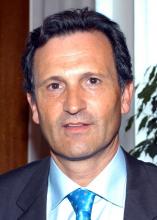Carlos Martínez Alonso

Ocupó este cargo hasta el 15 de abril de 2008, cuando fue nombrado Secretario de Estado de Investigación del Ministerio de Ciencia e Innovación.
Ha trabajado en distintos puestos de investigación en centros como el Departamento de Bioquímica de la Escuela Superior de Ingenieros Agrónomos, el Departamento de Inmunología de la Clínica Puerta de Hierro, el Instituto de Inmunología de Basilea, el Departamento de Inmunología de la Universidad de Umea (Suecia), el Centro Nacional de Investigaciones Científicas de París y el Departamento de Inmunología y Oncología del Centro Nacional de Biotecnología del CSIC y la Universidad Autónoma de Madrid, del que fue director desde 1996 hasta su nombramiento como presidente del CSIC.
Ha sido profesor visitante en el Ontario Cancer Institute, de Toronto; el Instituto Max Planck de Inmunología, en Friburgo, y el Instituto de Tecnología de California. A lo largo de los últimos 30 años, Carlos Martínez Alonso ha estudiado los leucocitos en diversos campos, desde la inmunología celular hasta las enfermedades autoinmunes. Ha analizado la activación linfocitaria, el papel de las respuestas quimiotácticas en situaciones fisiológicas y patológicas y los mecanismos moleculares implicados en el control de la muerte celular, junto con los mecanismos moleculares y celulares implicados en la infección por VIH.
Asimismo, ha participado activamente en la creación de varias empresas de base tecnológica y cuenta con más de 430 trabajos publicados en revistas científicas. Fue galardonado por la Real Sociedad de Ciencias Naturales en 1990 y por la Fundación Ciencias de la Salud en el año 2000. Obtuvo el XI Premio DuPont de Ciencia en 2001, el Premio Rey Jaime I a la Investigación Científica en 2003, el premio Lilly de Investigación Preclínica en 2004, el Premio a la Investigación Científica de Castilla y León, en 2004 y el Premio International Galen de Investigación Científica, también ese mismo año. Es miembro de varias academias científicas, entre ellas la Academia Europea.
Ha sido miembro de varios comités científicos de la OTAN, la UE y la HFSP, y ha presidido la European Molecular Biology Conference. Fue vicepresidente de la European Molecular Biology Laboratory Council, es miembro de la European Molecular Biology Organization (EMBO), vicepresidente de EUROHORCS y miembro de Patronato de ESF.
Apartado:
Presidente